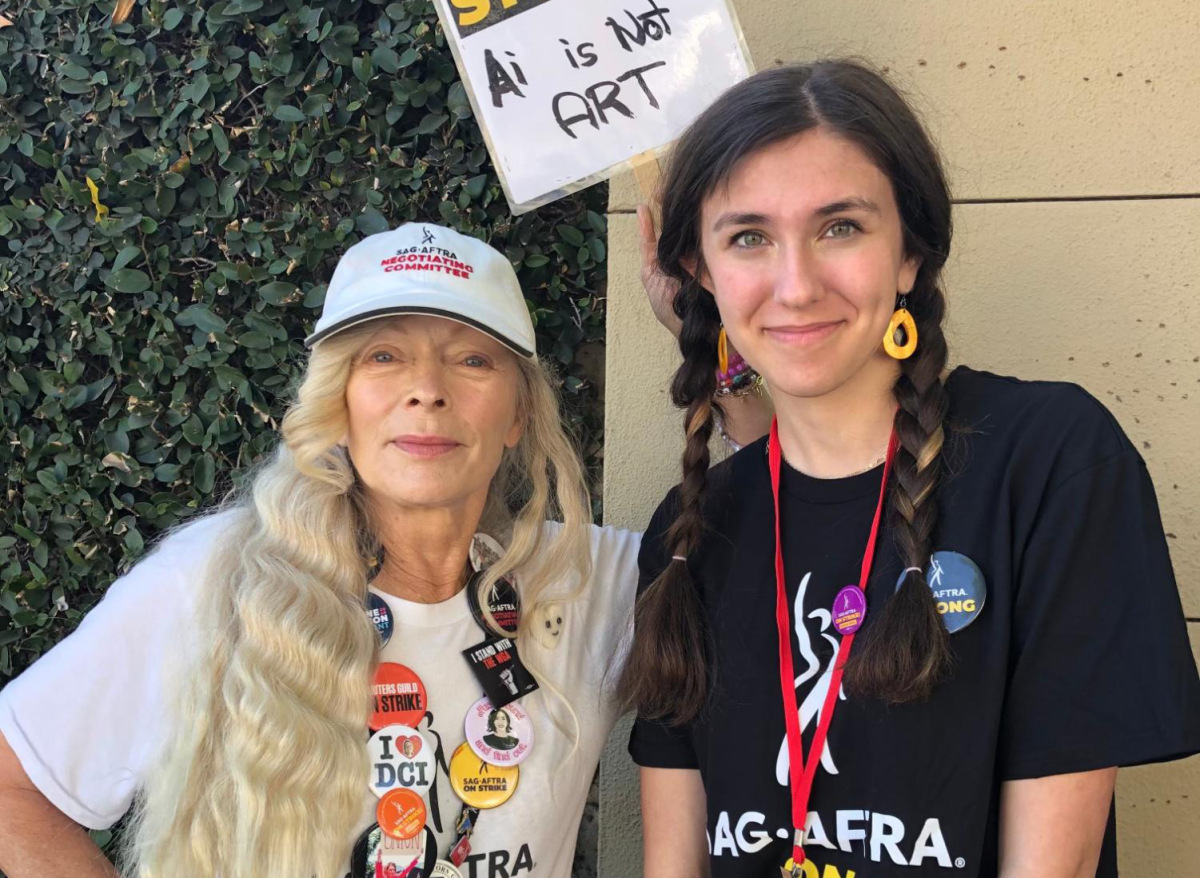The absence of new TV shows, movies continuously being delayed and countless news articles covering the heated battle between employers and workers. This is what anyone was bound to see wherever they looked, all summer long.
On May 2, 2023, the Writers Guild of America (WGA) went on strike. Just over two months later, on July 14, 2023, the Screen Actors Guild (SAG) joined the picket lines in solidarity, eventually striking for their own contract as well.
As a member of SAG myself, I joined the picket line at Warner Brothers Studios on Nov. 2, day 112, and spoke with many to see why this strike was happening and why it had been going on for so long.
Although the strike was making history, it was the future that many on the picket lines were trying to protect.
When one thinks of the future, a stereotypical idea may arise depicting flying cars, robots and automated living. This future is driven by technology, and the media is plagued with these sci-fi technological utopias. Although technology may promote the future, it might destroy it as well, a recent fear of many in the entertainment industry.
SAG-AFTRA is a national labor union that protects over 160,000 performers across the country, including not just actors, but also dancers, stunt people, news broadcasters, voice actors, singers and more. Membership grants certain protections to entertainers such as working conditions, wage negotiations and health protections such as the SAG-AFTRA Health Plan and pension benefits.
The unprecedented rise in streaming services coupled with the progress in AI technology has raised the anxieties of actors and writers alike.
Many fear the use of one’s image, performance or skills without proper compensation, whether it be the way actors are paid on streaming services or through A.I. generated performances, videos or scripts, used without proper payment or permission.
SAG actor and Negotiations Team Member Frances Fisher, known for her roles in “Titanic” and “Unforgiven,” explained that the strike isn’t asking for much, only fair and equal treatment for SAG’s members. However, this is a term that the studios – all under the name of the Alliance of Motion Picture and Television Producers, an association that represents the studios at the bargaining table – are unwilling to grant.
“The reason why we are on strike is because the producers and AMPTP are unwilling to meet the demands that we have, which is fair wages,” she said. “We’re not asking for a lot. A lot of people think that actors are all rich and they make millions and millions of dollars a year, well that’s the 0.1 percent of the members of our union.”
Actors on network/cable television get paid when media is played that they are shown in, in payment known as a residual, while on streaming, actors get paid a residual as an annual flat rate. With that, the streaming service still gets to make money off of an actor’s image and performance every time an episode or movie is played, through user subscriptions.
So, no matter the show’s success, actors will only make a fixed amount. With numerous shows and movies going viral on social media, producers and streaming services behind these projects are making vast amounts of money, while the actors are not.
Both the SAG and WGA strikes have caused the American entertainment industry to come to a screeching halt. Numerous high grossing shows, such as “Stranger Things,” “Emily in Paris,” “Hacks,” “Bunk’d” and many more stopped production this summer as both unions continued or began their strike.
Most SAG members were left unemployed for almost six months, some losing their houses, livelihoods and dreams of “making it” in the entertainment industry.
SAG Actress Jeri Ryan, known for her role in “Star Trek: Voyager,” and current role on “Star Trek: Picard” believes that the magnitude of the strike was needed to protect this career from dissolution.
“This is a critical moment for our industry,” she said. “We don’t have a choice. We’re not out here for fun, we’re not out here because we enjoy it, we’re out here because we have to be if we’re gonna continue to have this as a viable career option going forward.”
But it’s not just the actors that are experiencing the heat of the strike’s effects. Other members of the entertainment industry such as makeup artists, costume designers, set designers and even local coffee shop employees are all out of work thanks to the industry shutdown.
SAG actor and Head Strike Captain Terry Wilkerson believes that while the strike was a hard battle, with the members braving many long and sunny Los Angeles days, the protestors were passionate about the issues at hand, as well as each other.
“I tell everybody in our morning meetings we always lead by love,” he said. “We’re just a huge family, and its important that we establish that we are a family that spreads love, because if we have a great united front within our strike captains, and we’re showing love every morning then we can go out and just have that same great energy given to all of our members that show up day in and day out.”
Van Nuys High School has a large Performing Arts Magnet, with many students who plan to enter the entertainment industry after graduation or college, and the entire student body is consumers of entertainment in some way.
SAG Actress and Negotiations Team member Natalia Castellanos stresses the importance of the strike’s effects regarding the future of the industry.
“This is important because it’s not just about your livelihood at this moment,” she said. “It is for future generations. If we don’t get this contract right now, AI could completely take over your career and you’ll never have a career again.”
At 17 years old, SAG actor Sage Mayer is the youngest strike captain on the picket lines and says he sees himself as a representative for the younger generation.
“Us as young people are the next generation of SAG actors,” he said. “We need a fair deal from this contract. Hopefully when this is all over, this contract will change the industry going forward into the future.”
On Monday, the AMPTP released their “best and final offer.” After further negotiations regarding AI, SAG agreed on the contract on Wednesday, Nov. 8, ending the strike on Thursday afternoon.
With new technology comes evolution, but also its fair share of problems. An evolving industry needs evolving standards to ensure the well treatment of its workers. Even if one never plans to go into entertainment, this deal sets a precedent for the rights of employees against AI technology.
AI is not art, and the contract from this strike hopes to keep it that way. Not only for the industry now, but for the future of entertainment as we know it.




Lorraine Patch • Nov 11, 2023 at 10:04 am
This was a great article. It shows the dedication of the strikers but explained in detail what was at stake. Excellently written.